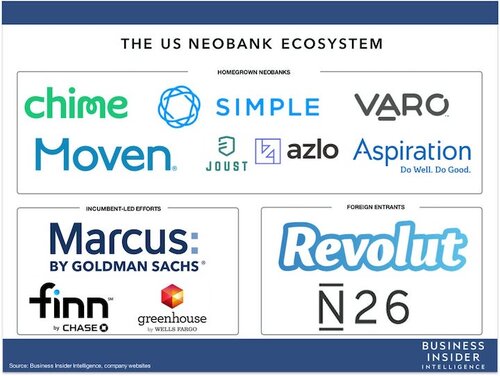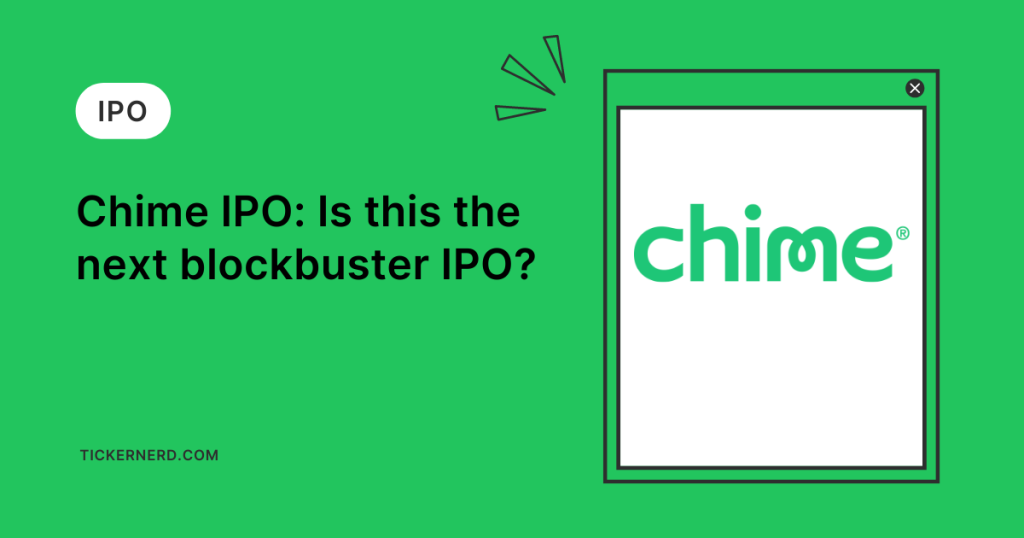| Chime IPO Date (Predicted): | 2024 |
| Chime Valuation: | $25 billion (estimated) |
| Total Revenue (2022): | $1.8 billion |
| Total Funds Raised: | $2.3 billion |
| Number of Employees: | 1,600+ |
| Headquarters: | San Francisco, California |
| Founded: | 2012 |
Overview
- A spokesperson from Chime when asked about a potential IPO said, “while Chime intends to be a publicly listed company someday, we have not made any decisions on underwriters and have no immediate plans for an IPO.”
- The frozen IPO market for venture-backed companies has delayed the company's IPO ambitions.
- Chime reportedly has 21.6 million account holders as of January 2023. The business made $1.8 billion in revenue in 2022, a jump of 94% when compared to the previous year.
Chime's IPO Details
Chime is one of the hottest fintech companies in the world. Founded in 2013 by Chris Britt and Ryan King, it's been rumored for a while now that they're considering going public.
The business has grown insanely quickly, thanks to its customer-first approach (essentially doing the opposite of traditional banks). Offering perks like fee-free banking, early access to direct deposits, and high-yield savings accounts.
Initially, Chime was all set for a March 2022 debut with a valuation between a whopping $35 and $45 billion. However, the rollercoaster that is the financial market had other plans, and a 40% drop in most fintech companies since October 2021 put the brakes on that plan.
As it stands, they haven't announced an IPO date, but it's expected they'll be listed on the Nasdaq. Founder and CEO Chris Britt stated that Chime was considering options including a direct listing, traditional IPO, and even SPACs.
The poor market conditions have not been kind to fintech stock valuations. For example, as of 28 June 2023, SoFi is down from its IPO price while MoneyLion another fintech company is down over 90% since going public.
Despite a recent dip in Chime's valuation, they remain a compelling alternative to traditional banking services. So, if you're an investor, keep your eyes peeled for their IPO.
How to Invest in Chime's IPO
If you’re reading this article there’s a good chance you’re looking to buy Chime stock before its IPO ready. While it’s typically tricky for retail investors to buy pre-IPO shares of a private company, there are a few potential ways you can make it happen:
- Private Equity Funds
- Pros: These funds often have access to pre-IPO shares in companies like Chime. Some funds are also publicly traded which means retail investors can buy in too. An example of this is the Pengana Capital Group which has a private equity fund that is tradable on the Australian Stock Exchange.
- Cons: Most private equity funds aren't publicly traded and require a significant minimum investment. They're also typically accessible only to accredited investors. They can come with long lock-up periods, meaning your money could be tied up for several years.
- Secondary Markets
- Pros: Platforms like SharesPost or Forge Global allow accredited investors to buy pre-IPO shares from employees or early investors looking to cash out.
- Cons: The liquidity can be low, and not all companies' shares are available. You’ll need to be an accredited investor, and there's a risk the IPO might not go ahead or perform as expected.
- Direct Investment
- Pros: If you're an accredited investor, you could reach out to Chime directly to purchase shares. This could get you in at a lower price than the IPO.
- Cons: This approach requires serious capital and connections as there's a long list of people who want to buy Chime stock. This option isn't on the table for the average investor. It also comes with high risk as the IPO could fail or the shares could depreciate.
- Invest in a SPAC
- Pros: If Chime decides to become a public company via a SPAC (Special Purpose Acquisition Company), you can invest in that SPAC before the merger. SPACs are open to retail investors and could provide early access to Chime's shares.
- Cons: The SPAC route can be risky and speculative. If the merger doesn’t go through, the SPAC's shares could plummet.
- Invest in Related ETFs
- Pros: ETFs that focus on fintech stocks and may invest in Chime once it goes public. You can buy into these ETFs beforehand, assuming they’ll add Chime to their portfolio. Some fintech ETFs include Ark Fintech Innovation ETF (ARKF), Capital Link Global Fintech Leaders ETF (KOIN) and Global X FinTech ETF (FINX).
- Cons: It’s not a direct investment in Chime, and your investment’s performance will be tied to the overall portfolio, not just Chime. There's no guarantee the ETF will add Chime to its portfolio either.
Remember, investing in private companies (even Chime) is risky. None of the options above is a recommendation. Always consider seeking investment advice from a financial advisor before making these types of decisions.
Who are Chime's major investors?
There are currently 32 institutional investors who hold Chime stock. These include:
- General Atlantic
- Tiger Global Management
- Sequoia Capital Global Equities
- SoftBank Vision Fund
- Dragoneer Investment Group
- Empede Capital
- Coatue
- DST Global
- Whale Rock Capital Management
Source: Crunchbase
How does Chime make money?
Chime makes money from a combination of interchange fees, ATM fees, overdraft fees and interest on deposits. Chime also generates revenue from interest payments for its debit card and credit card products. In 2020, they managed to double their user base from 5 to 10 million, raking in $600 million in revenue.
This caught the attention of high-profile investors like Tiger Global and ICONIQ who invested $485 million in Chime's Series F later that year. This funding round was dwarfed in less than 12 months when Chime raised $750 million in another funding round led by Sequoia Capital. This funding round led to the company's valuation hitting $25 billion and got everyone talking about an IPO.
We're seeing a shift away from traditional financial institutions and a major move towards online banking companies. Consumers no longer want to wait in line at physical branches to do their banking. Advancements in tech have made it possible to do nearly all your banking directly on your smartphone.
While Chime has managed to snag a significant chunk of the market share, let's not kid ourselves, the competition is fierce. Many traditional banks have been forced to compete in the online banking space after the arrival of fintech companies like Chime. By bringing their financial products online they can still serve millions of customers and generate billions in profits.
Who are Chime's competitors?
As of 2023, Chime is the most popular neobank in the US with over 14.5 million customers and has generated $1.8 billion in revenue. But Chime isn't the only company trying to disrupt traditional banks. Its notable competitors include other tech companies building mobile banking platforms such as Robinhood, Venmo, and Square’s Cash App. Fintech players from Europe are also entering the US market. These include neobanks like Revolut, Monzo, and N26 who pose a threat to Chime's market share.

Despite offering a better customer experience than the old-school banks there are still aspects of banking that Chime struggles in. For example, Chime's customers have suffered from service outages that left them stranded mid-transaction.
Chime also still lacks traditional banking features such as personal loans, car loans, mortgage loans, trading services, investment assistance, and 24/7 customer support. The problem for Chime is its European competitors N26 and Revolut do offer these features and can use this as leverage to steal its customers.
Who founded Chime?
Chime was founded by Chris Britt and Ryan King in 2012, with Britt serving as the CEO and King as the CTO. Since its launch, Chime has managed to raise $1.5 billion in private funding and was named one of Fortune's Best Places to Work in 2022.
Chris Britt comes from a finance background, having served as a senior executive at GreenDot and Visa prior to founding Chime. His vision was to create a bank that would not rely on bank fees or profit from a customer's financial mistakes but would directly help clients increase their financial health.
Ryan King, on the other hand, comes from an impressive tech background. Before co-founding Chime, he was the Vice President of Engineering at Plaxo, an early professional social networking pioneer that was acquired by Comcast Interactive Media. Prior to Plaxo, King worked at Liberate Technologies and Microsoft. He holds a Master's degree in Computer Science from Stanford University and a Bachelor's degree in Computer Science & Engineering from UCLA.
The pair have complementary skills. It seems that combining Britt's financial expertise and King's tech background have allowed them to build a fintech powerhouse in Chime.
Frequently Asked Questions
At the time of writing, Chime is not publicly traded. CEO Chris Britt told CNBC the company is considering an initial public offering.
While there are no immediate plans for an IPO date, mainly due to the frozen IPO market. It is possible Chime's initial public offering could happen as soon as 2024.
Chime has raised $2.3 billion to date as of June 29, 2023.





